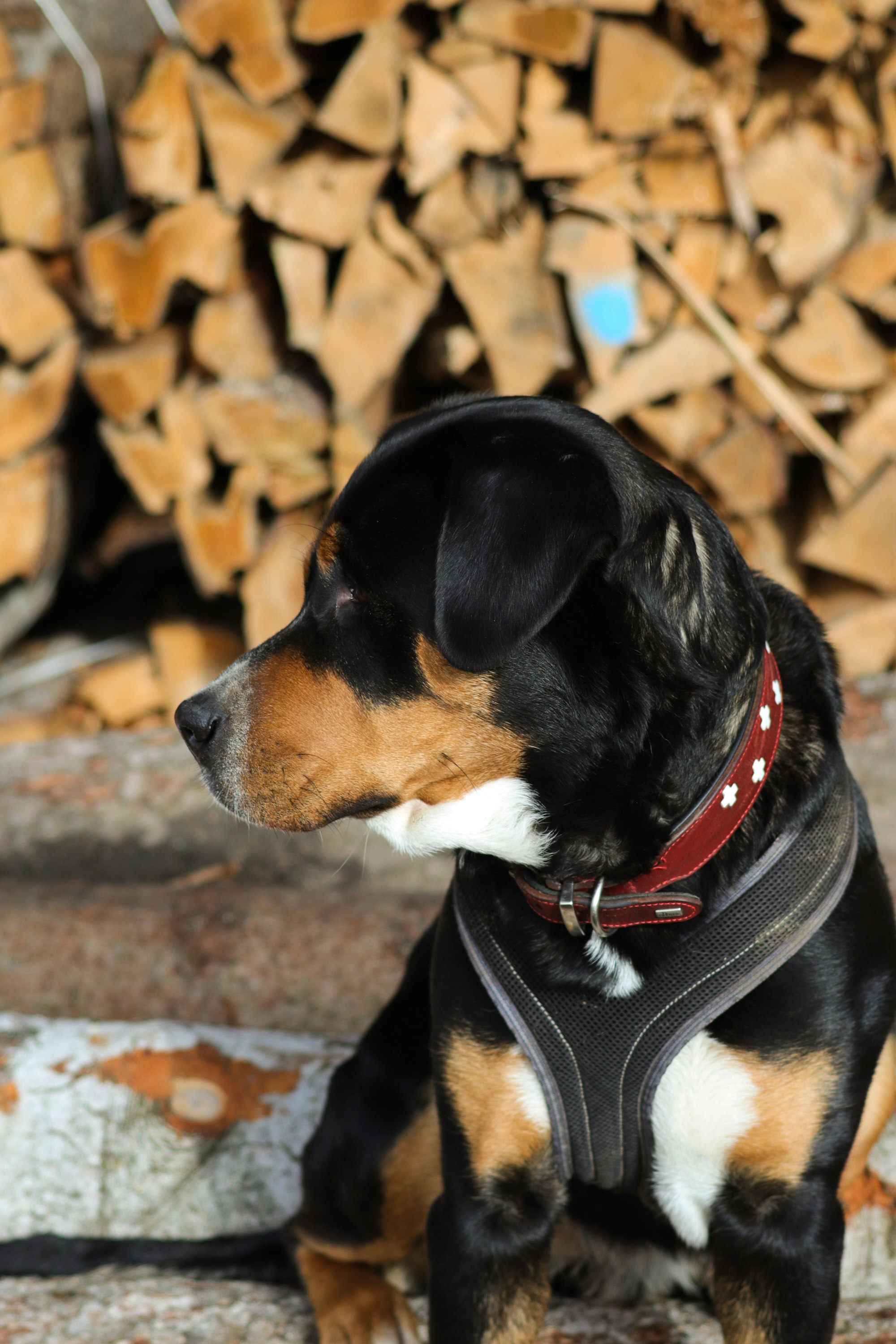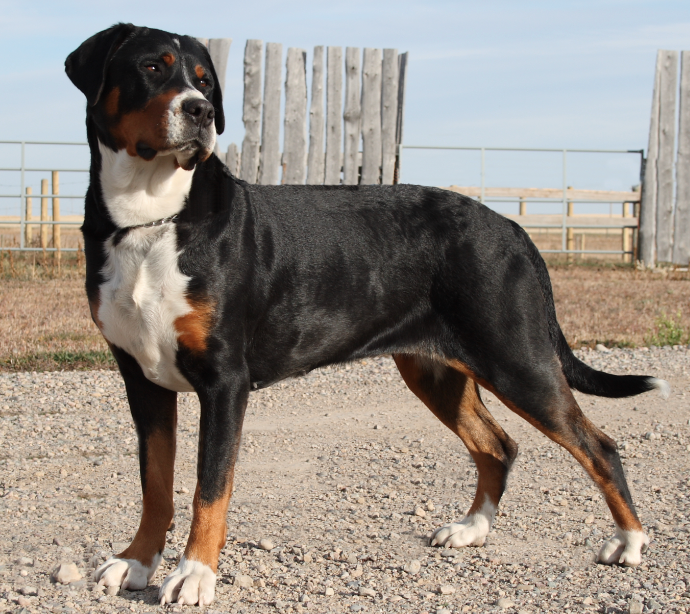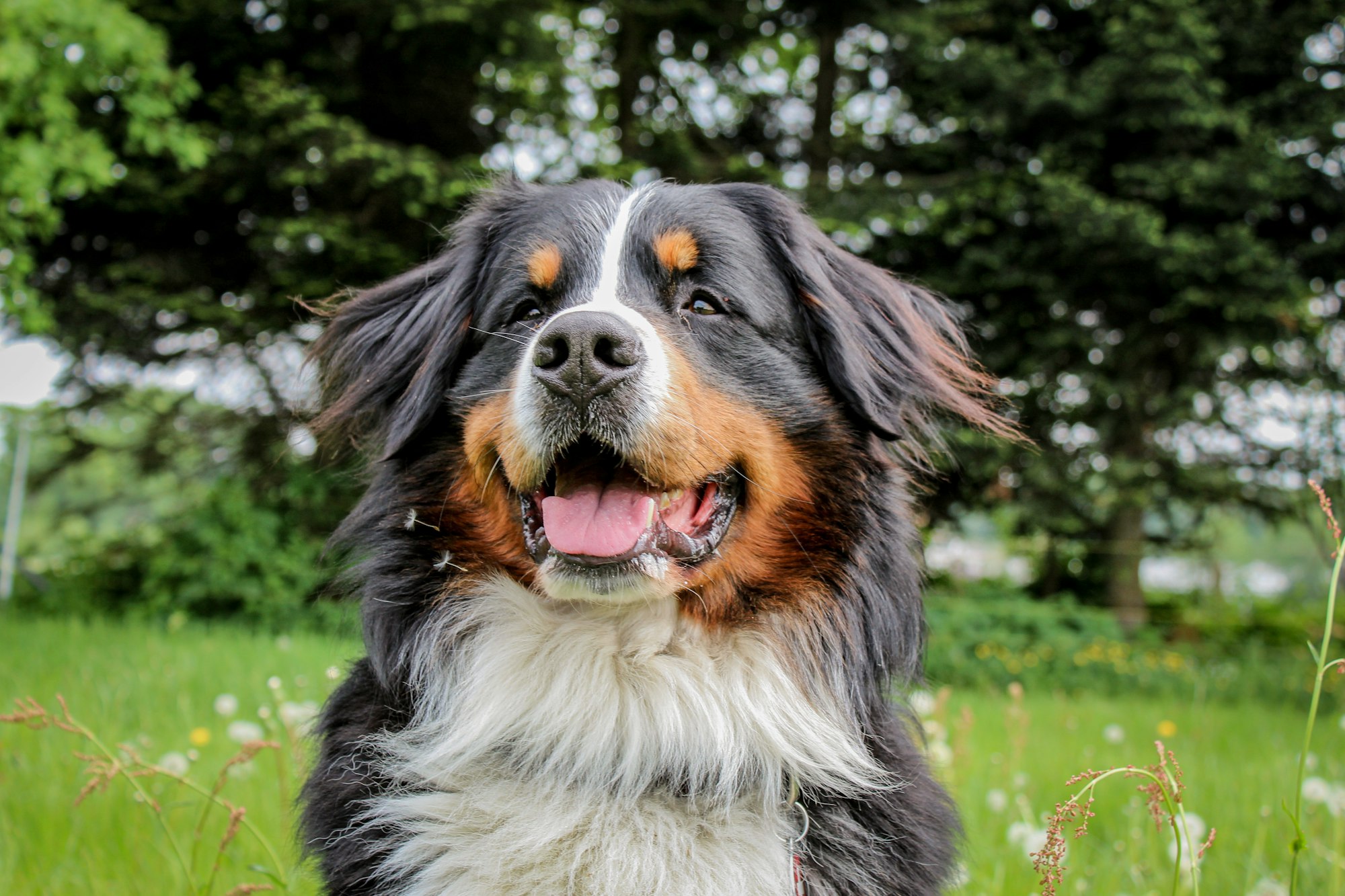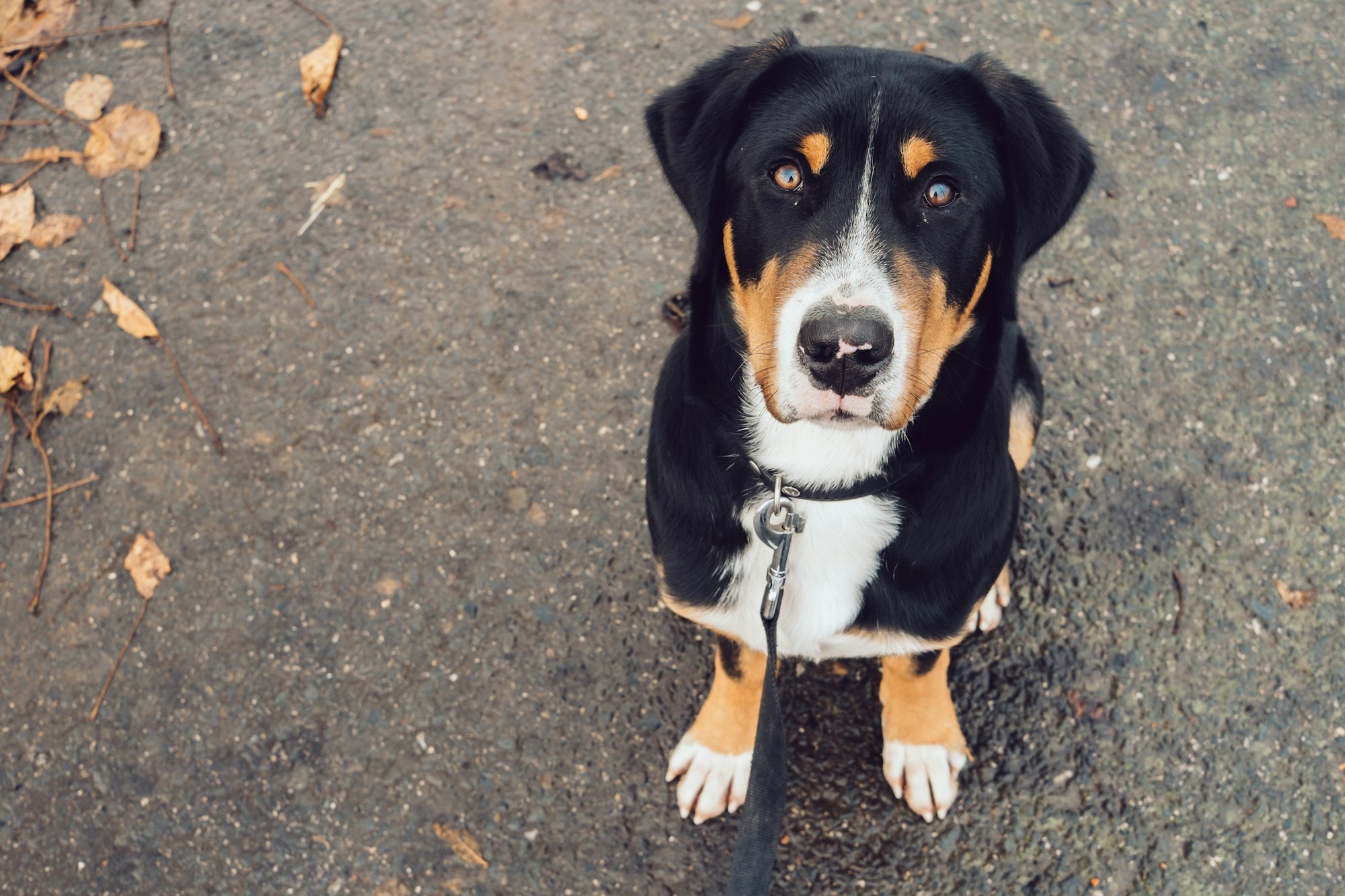Welcome to the world of Swiss Mountain Dogs! These lovable and majestic canines have captured the hearts of dog enthusiasts around the globe. In this article, we'll explore the history, physical characteristics, temperament, training, grooming, health, and much more about Swiss Mountain Dogs. So, let's embark on this delightful journey of discovery!
History of Swiss Mountain Dogs
Swiss Mountain Dogs, also known as Bernese Mountain Dogs or Swissies, have a rich history that dates back several centuries. These dogs were initially bred in the Swiss Alps, where they act as versatile working dogs. Their primary roles enclosed herding livestock, pulling carts, and guarding properties. With their strong figure and gentle nature, they quickly became indispensable companions to Swiss farmers and Alpine dwellers.

Physical Characteristics and Temperament
Physical Characteristics
Size and Build: Swiss Mountain Dogs are big and sturdy canines. Males typically stand between 25 and 27.5 inches at the shoulder, while females vary from 23 to 26 inches. In terms of weight, males typically weigh between 80 and 115 pounds, while females weigh between 70 and 95 pounds. They have a well-balanced and muscular build, with a deep chest, broad shoulders, and a straight back.
Coat and Colors: The coat of a Swiss Mountain Dog is one of its most distinctive characteristics. It is thick, moderately long, and weather-resistant, providing outstanding protection in various climates. The coat is made of a dense, soft undercoat and a longer, coarser outer coat. Swiss Mountain Dogs have a tricolor design, with a black base color and symmetrical rust-colored markings on their cheeks, eyebrows, chest, and legs. They also have white patches on their chest, face, and end of the tail.
Head and Facial Features: The head of a Swiss Mountain Dog is wide and emphatic, with a gentle countenance that reflects their kind and intelligent personality. They have medium-sized, dark, almond-shaped eyes that exude warmth and friendliness. The ears are medium in size, set high on the head, and triangular-shaped, hanging tight to the cheeks.
The muzzle is robust and well-defined, with a black nose and powerful jaws. Their lips are tight and black, blending seamlessly with the rest of their facial traits.

Temperament
Swiss Mountain Dogs have a reputation for being gentle, loyal, and loving. They are known for their friendly and patient nature, making them ideal family dogs. Their calm temperament and willingness to please make them a joy to be around. Swiss Mountain Dogs create strong bonds with their human family fellows and are especially good with children. They are often described as existing gentle giants.
Despite their large size, Swiss Mountain Dogs are typically not aggressive. They are pacifist and easygoing, preferring harmony and companionship. However, as with any breed, early socialization and proper training are essential to ensure they grow up to be well-rounded and well-behaved dogs.
Swiss Mountain Dogs are also known for their cleverness and eagerness to learn. They respond well to positive reinforcement training approaches and enjoy engaging in activities that boost their minds. They excel in obedience training, agility, and even therapy work. Their brilliance and trainability make them versatile dogs who can adjust to various roles and tasks.
Hence, Swiss Mountain Dogs possess striking physical characteristics and gentle temperaments that make them highly sought-after companions. Their enormous size, sturdy build, and tricolor coat make them visually remarkable dogs. Their calm, friendly, and patient nature, coupled with their intellect and trainability, contribute to their vogue as loving family pets. Swiss Mountain Dogs are not only attractive to look at but also offer unwavering loyalty and tenderness to those fortunate enough to have them as part of their lives.
Training and Exercise
Swiss Mountain Dogs are intelligent and eager to please, making them relatively easy to train. Early socialization and obedience training are essential to ensure they grow into well-rounded dogs. Positive reinforcement techniques work best with these sensitive canines, as harsh methods can lead to fear or mistrust. They thrive in an environment where mental and physical exercise is provided regularly. Long walks, play sessions, and puzzle toys are excellent ways to keep them engaged and stimulated.

Grooming and Maintenance
While Swiss Mountain Dogs have beautiful coats, they do require regular grooming to keep them in top condition. Their fur is prone to shedding, especially during seasonal transitions, so a thorough brushing session a few times a week is necessary to prevent matting and keep the coat healthy. Additionally, routine maintenance such as nail trimming, teeth brushing, and ear cleaning should be a part of their grooming regimen.
Health and Common Issues
Like all dog breeds, Swiss Mountain Dogs are prone to certain health issues. Some common conditions that can affect them include hip and elbow dysplasia, which are abnormalities in the development of these joints. They may also be susceptible to certain cancers, bloat, and eye diseases. Regular vet check-ups, a balanced diet, exercise, and maintaining a healthy weight can help mitigate these risks and ensure the well-being of your Swiss Mountain Dog.
Diet and Nutrition
Providing a nutritious and well-balanced diet is crucial for the overall health and longevity of Swiss Mountain Dogs. As large and active breeds, they require high-quality dog food that is specifically formulated for their size and activity level. Consult with your veterinarian to determine the appropriate feeding portions and frequency based on your dog's age, weight, and activity level. It's important to monitor their weight and adjust their diet as needed to prevent obesity, which can lead to various health problems.
Living with a Swiss Mountain Dog
Living with a Swiss Mountain Dog is a rewarding experience, but it's important to consider their needs and lifestyle requirements. These dogs thrive in homes with spacious yards where they can roam and play. They have a moderate energy level, so daily exercise is essential to keep them mentally and physically stimulated. Swissies are also social creatures and prefer to be included in family activities rather than being left alone for extended periods.
Choosing a Swiss Mountain Dog
In this stepwise section, we will walk you through the process of choosing a Swiss Mountain Dog to help you make an informed decision.
1. Research the Breed: Before committing to any dog breed, it's critical to conduct thorough research. Learn about the breed's history, features, temperament, and exact needs. Swiss Mountain Dogs are known for their large size, soft nature, and loyalty. They require regular exercise, grooming, and socialization. Understanding these factors will help you determine if a Swiss Mountain Dog aligns with your lifestyle and expectations.
2. Evaluate Your Lifestyle: Consider your daily routine, residence condition, and activity level. Swiss Mountain Dogs thrive in surroundings where they receive ample exercise, awareness, and social interaction. They enjoy being part of the household and may not do well if left alone for an extended time. Assess whether you have the time, energy, and resources to meet the requirements of a Swiss Mountain Dog. Their size and strength should also be consistent with your living space.
3. Finding a Reputable Breeder: When you've decided that a Swiss Mountain Dog is the right choice for you, it's essential to find a reputable breeder. Look for breeders who prioritize the health and well-being of their dogs. They should conduct health screenings on their breeding stock to minimize the risk of genetic disorders. Visit the breeder's facility, ask questions, and observe the dogs' living conditions. A responsible breeder will provide proper care, socialization, and necessary vaccinations for their puppies.
4. Meeting the Parents: Whenever possible, meet the puppy's parents or at least one of them. Observing the temperament and behavior of the parents can give you insights into what to expect from the puppy. Swiss Mountain Dogs should exhibit a gentle and friendly disposition, with no signs of aggression or excessive shyness. Additionally, assessing the parents' physical characteristics can help you gauge the potential size and appearance of the puppy as it grows.
5. Assessing Health and Documentation: Ensure that the puppy has been examined by a veterinarian and is up-to-date on vaccinations and deworming. Request documentation such as health certificates, vaccination records, and any genetic testing results. A reputable breeder will provide these documents and be transparent about the health history of the puppy and its lineage. Avoid purchasing puppies from sources that cannot provide proper documentation.
6. Bonding and Compatibility: Take the time to interact with the puppy you are considering. Observe its behavior, responsiveness, and level of comfort with you and other family members. A strong bond and compatibility are essential for a successful and fulfilling relationship. If possible, involve all family members in the decision-making process to ensure that everyone is on board and comfortable with the chosen Swiss Mountain Dog.
Differences Between Greater Swiss Mountain Dog and Bernese Mountain Dog
The Swiss Mountain Dog and Bernese Mountain Dog, while both originating from Switzerland, are distinct breeds with some notable differences:
- Breed Origins: The Swiss Mountain Dog, also known as the Greater Swiss Mountain Dog, is one of the oldest Swiss working breeds. On the other hand, the Bernese Mountain Dog is a Swiss breed that was developed in the region of Bern.
- Appearance: The Swiss Mountain Dog is a large and sturdy breed with a short double coat, featuring a black base color with distinct rust and white markings. The Bernese Mountain Dog, also large in size, has a long and silky tri-colored coat of black, rust, and white, with symmetrical markings on the face.
- Temperament: The Swiss Mountain Dog is known for its friendly, loyal, and gentle nature. They are typically confident, alert, and great with families and children. Bernese Mountain Dogs are also friendly and gentle, but they are known to be more laid-back and easygoing in temperament.
- Purpose: Historically, Swiss Mountain Dogs were utilized as working dogs for various tasks such as herding, guarding, and pulling carts. Bernese Mountain Dogs were originally bred as working farm dogs, assisting with tasks like herding cattle, pulling carts, and guarding property.
- Health: Both breeds can be prone to certain health issues. Swiss Mountain Dogs are susceptible to hip dysplasia, elbow dysplasia, and bloat. Bernese Mountain Dogs are more prone to cancer, hip and elbow dysplasia, and certain genetic disorders.

It's essential to thoroughly research and consult reputable breeders or breed-specific organizations to fully understand the characteristics, care needs, and potential health concerns of each breed before making a decision.
Breeding and Puppies
Breeding Swiss Mountain Dogs should be undertaken responsibly and with a focus on improving the breed. Breeding should only be done by knowledgeable and ethical breeders who prioritize health, temperament, and conformation. The process requires careful planning and consideration to ensure the well-being of the parent dogs and the resulting puppies. If you decide to bring a Swiss Mountain Dog puppy into your home, be prepared for their high energy levels and invest time in their training and socialization from an early age.
Famous Swiss Mountain Dogs
Over the years, Swiss Mountain Dogs have gained popularity and even found their way into the hearts of celebrities. Some famous Swissies include "Sennenhund" from the popular Swiss cartoon "Globi," and "Rufus" who won the Best in Show title at the Westminster Kennel Club Dog Show in 2003. These dogs have left their paw prints on history and continue to be beloved companions to countless families worldwide.
Swiss Mountain Dogs in Pop Culture
Swiss Mountain Dogs have also made appearances in various movies, books, and TV shows, capturing the attention of audiences worldwide. Their charming appearance and loyal nature have made them memorable characters in pop culture. From animated films to heartwarming stories, Swiss Mountain Dogs continue to captivate the imaginations of dog lovers everywhere.

Conclusion
In conclusion, Swiss Mountain Dogs are remarkable creatures with a rich history and a gentle disposition. Their loyalty, intelligence, and striking appearance make them a wonderful addition to any family. However, it's important to consider their needs, provide them with proper care, and ensure they receive the love and attention they deserve. If you're ready to embark on an incredible journey with a Swiss Mountain Dog, you're in for a lifetime of joy and companionship.
FAQs
If you are considering adding a Swiss Mountain Dog to your family, you may have some questions. In this section, we will address some frequently asked questions about Swiss Mountain Dogs to provide you with valuable information. Here are some of the most common frequently asked questions:
1. Are Swiss Mountain Dogs good family pets?
Yes, Swiss Mountain Dogs are known for being fantastic family pets. They have a gentle and patient nature, making them great companions for kids. They are also loyal, and affectionate, and enjoy being part of the home. However, it's important to note that due to their large size, supervision is required when they interact with small children to control accidental knocking over or injury.
2. How much exercise do Swiss Mountain Dogs require?
Swiss Mountain Dogs are an active breed and require regular exercise to keep them physically and mentally stimulated. Daily walks, playtime, and activities such as hiking or swimming are recommended. They also enjoy participating in obedience training, agility, and other dog sports. Providing them with outlets for their energy will help keep them happy and healthy.
3. Do Swiss Mountain Dogs shed a lot?
Yes, Swiss Mountain Dogs have a dense double coat, and they do shed. They have a heavier shedding season during the spring and fall when they "blow" their coats. Regular brushing, at least once or twice a week, is necessary to remove loose hair and prevent matting. Despite shedding, many Swiss Mountain Dog owners find that with proper grooming maintenance, the shedding is manageable.
4. Are Swiss Mountain Dogs good with other pets?
Swiss Mountain Dogs can generally get along well with other pets, including cats and smaller animals when properly socialized from a young age. Early socialization and gradual introductions are important to help them develop positive relationships with other animals. As with any dog breed, individual temperament and training also play a role in their compatibility with other pets.
5. What are the common health concerns for Swiss Mountain Dogs?
Swiss Mountain Dogs are generally a healthy breed, but like numerous large breeds, they are prone to specific health issues. Some common health situations include hip and elbow dysplasia, certain types of cancer, bloat, and progressive retinal atrophy (PRA). Regular veterinary check-ups, a balanced diet, exercise, and preserving a healthy weight can help reduce the risk of these health problems. It's also required to obtain a Swiss Mountain Dog from a reputable breeder who conducts health screenings on their breeding stock.
6. How long do Swiss Mountain Dogs live?
The average lifespan of a Swiss Mountain Dog is typically around 6 to 8 years. However, with proper care, some Swiss Mountain Dogs can live up to 10 years or longer. Providing them with a balanced diet, regular exercise, recurring veterinary care, and a loving environment can contribute to their comprehensive health and longevity.
7. How often should I groom my Swiss Mountain Dog?
Regular grooming is necessary to maintain the health of their coat. Aim for brushing sessions a few times a week and check for any tangles or matting. Bathing can be done as needed.
8. Where can I find a Swiss Mountain Dog to adopt?
You can start by contacting local breed-specific rescue organizations or checking reputable breeder directories. It's important to do thorough research and choose a source that prioritizes the well-being of the dogs.
For more helpful articles about pet-parenting tips, check out the Off Leash blog at TryFi.com.
Want to know more about TryFi.com? The Fi Dog Collar is a GPS tracking collar that not only keeps track of your dog’s location, activity levels, and sleep patterns, but it also alerts you if your dog escapes your backyard. This is the fastest way to find your dog after an escape. Try the Fi Dog Collar today!






